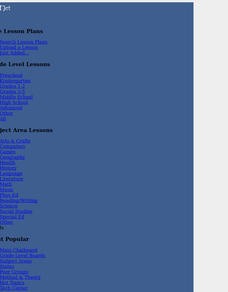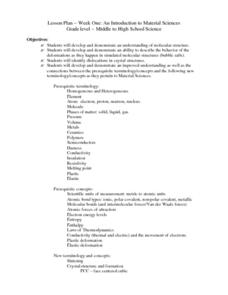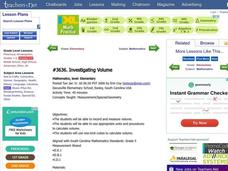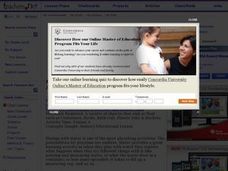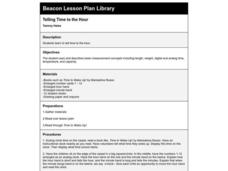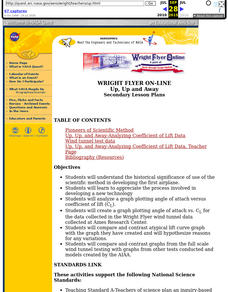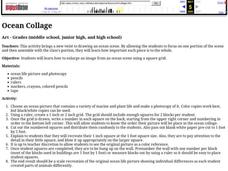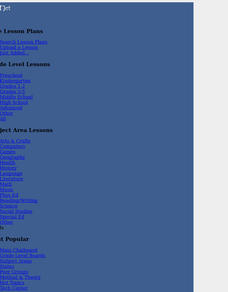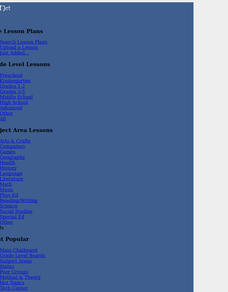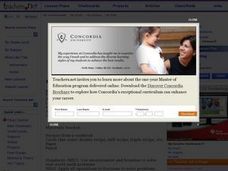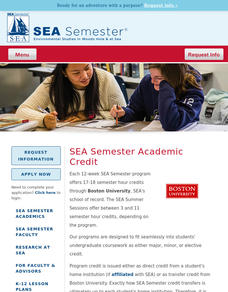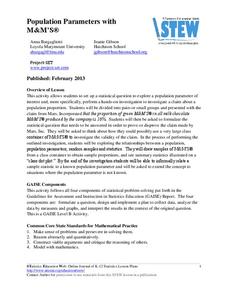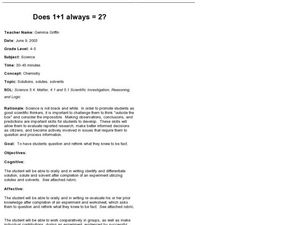Curated OER
Pollution
First graders identify and discuss different kinds and sources of of pollution. They explain why it is important to keep the environment free of pollution. They make a poster depicting the dangers of pollution and make litter boxes.
Curated OER
Recording Treasure
Students participate in a garage sale. They will weigh the items sold. They will calculate the total weight of items sold and donated to an agency.
Curated OER
Asphalt Lab
Students are introduced to basic engineering principles, road construction and material science. They explore how material properties and strength can be affected. Students become Civil Engineers by both creating Asphalt cookies and by...
Curated OER
An Introduction To Material Sciences
Young scholars investigate the concept of molecular structure. They describe the behavior of simulated molecules and identify any dislocations in crystalline structures. They also define various related vocabulary words and use them in...
Curated OER
Investigating Volume
Students investigate the components of volume and use appropriate units and procedures to calculate the volume of several household boxes.
Curated OER
Catalog Display for the Novel : The Family Under the Bridge by Natalie Carlson
Fourth graders explain the novel through creative descriptions, learn importance of word choice in descriptive writing, and implement technology skills of searching the Internet, typing, cutting and pasting, graphic designs, and...
Curated OER
Sink or Float Water Play Activity
Pupils experiment with different objects to see if they sink or float. They can also choose certain colored items if more review is necessary.
Curated OER
Interpreting Company Accounts
Students look at the two aspects of interpreting company accounts. They can be closely related to each other. Depreciation is investigated and is interpreted according to the inquiry made. The affect of how accounts are presented is...
Curated OER
Untitled Document Aerospace Team Online:
Students explain the historical significance of use of the scientific method in developing the first airplane and appreciate the process involved in developing a new technology.
Curated OER
Ocean Collage
Students re-create an image from a marine life scene. They are given a single square of the entire picture to focus on. When all squares are completed, the picture is assembled.
Curated OER
Fossilworks
Students research fossils and fossil formation. They explain how fossils are formed, identify fossil formations and use casting plaster to produce fossil replicas.
Curated OER
Acids & Bases: What's the Solution?
Learners conduct an experiment called "What's the Solution? Acid, Base or Neutral." to determine the differences between these types of substance.
Curated OER
Oobleck
First graders explore Oobleck. They manipulate and observe the properties of Oobleck. Students discuss the differences between solids and liquids. They investigate Oobleck. Students write a sentence describing what they observed about...
Curated OER
Self-Esteem through Literature and Music
Students research representations of self-esteem in music and literature, reflect on their meanings and use in developing positive attitudes. They make a presentations based on their research. They also keep a daily journal.
Curated OER
Cuisenaire Chefs
Learners study the fractional values of Cuisenaire rods while working with favorite family recipes.
Curated OER
Recipe Fractions
Students practice multiplying and dividing fractions by doubling, halving, tripling, etc., recipes from a cookbook.
Curated OER
Fluid Friction
Students, using wood blocks and model boats, investigate how the shape of an object affects friction it encounters as it is drawn through a towing tank.
Curated OER
STRAINING FOR SOUND
Sixth graders use a laser along with computer microphone probeware and the appropriate software, 6th graders determine the speed of rotating objects.An audio amplifier is connected to a solar cell to change the laser light signal into a...
Curated OER
Calculating Stride Length
How many steps does one take to walk a mile? The number of steps one walks in a mile would definitely depend on the length of his stride. Shorter people may take shorter strides, and taller people may take longer strides. This activity...
Curated OER
Ecology Explorers
Students create accurate, detailed map showing physical features, plants and trees, and other details of three school sites.
Statistics Education Web
Population Parameter with M-and-M's
Manufacturers' claims may or may not be accurate, so proceed with caution. Here pupils use statistics to investigate the M&M's company's claim about the percentage of each color of candy in their packaging. Through the activity,...
Curated OER
Does 1 + 1 always = 2
What a great way to explore the scientific process! Learners conduct an experiment in which they use sugar and water to illustrate the concept of solutes and solvents. With this hands on approach, they are bound to remember what they...
Curated OER
The Euro in Crisis
The November 14, 2011 edition of the New York Times included an article about debt and the European economy. Critical readers use the article to answer 13 who, what, when, where, and why questions.


